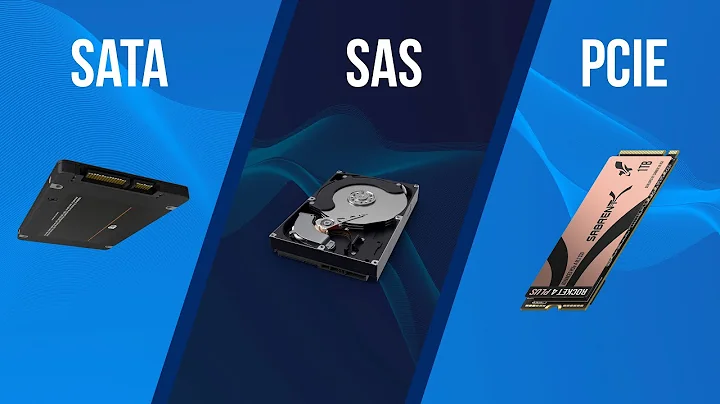What are the merits of SAS vs SATA drives?
Solution 1
SAS=SCSI=manageability, especially under load and also better prefailure diagnostics and tuning capability. Spendy and low capacity/£$€.
SATA=value, capacity and adequate performance for many loads but be aware that 99%+ of SATA drives aren't designed to work 24/7/365 under duress. Also putting them under busy server workloads can dramatically affect their MTBF.
I'd recommend SATA for everything but server and top-end workstation work. You really can't beat SAS for DB work overall.
Solution 2
There are two separate parts to your question. Simplifying a bit, a disk consists of the hardware and the controller. Usually when people say "SAS" or "SATA" they are referring to the controller. In principle SAS is a more sophisticated protocol, though in practice for servers with up to say 8 disks there probably isn't much difference between them.
Re the hardware: disk hardware tends to come in two classes based on the seek time. Fast disks have a seek time of 3 to 4 milliseconds while the slower disks have a seek time of 7 to 9 milliseconds. (I say "slower", but 7-9ms is still pretty fast!).
In general SAS controllers are fitted to fast disks while SATA controllers are fitted to slower disks, though there are exceptions. For example the Western Digital Velociraptor disks have a SATA controller but a 3ms seek time. So when people say "SAS disks" this is usually taken to mean "fast disks with a SAS controller" while "SATA" means "slower disks with a SATA controller".
All very well, but to actually answer your question, the seek time is very important when the disks have to do lots of random access. Good examples of this are SQL Server and Exchange. If the disks are a bottleneck then SAS disks will be a lot faster than SATA. However there are two points to make.
Firstly a good controller will make a lot of difference. I use Dells and I particularly like the Perc5/i and 6/i controllers. I have several 2950s with 6 SATA disks on a Perc5/i as a RAID 5, and these are pretty damn fast. Maybe they're not as fast as 6 SAS disks would be, but they're faster than say a 4 SCSI 320 disk RAID 5 on a Perc 4/e that I used to use in the older 2850 servers.
Secondly even though SATA disks are slower than SAS, in many small businesses disk speed won't be a bottleneck.
One last consideration is that traditionally SCSI disks have been (much) more reliable that SATA, not becuase of the controller, but simply because the disk hardware was built to a higher (and more expensive!) standard. Now that you have brands like the Western Digital RE3 SATA disks designed specifically for servers I'm not sure if this is still that much of an issue.
JR
Related videos on Youtube
Tim
Updated on September 17, 2022Comments
-
Tim almost 2 years
What are the merits of buying SAS drives over SATA drives, or vice versa?
-
Will Dixon about 11 yearspossible duplicate of Why is Enterprise Storage so expensive?
-
-
Chopper3 about 15 yearsI'm happy to be put right on this one, and sorry to be negative, but I think there's a general rule on SF that you shouldn't cut'n'paste from elsewhere - although linking is fine, as is paraphrasing, again sorry to be a grump.
-
 Vinko Vrsalovic about 15 yearsYou are forgetting speed, which is why you can't beat SAS for DBs
Vinko Vrsalovic about 15 yearsYou are forgetting speed, which is why you can't beat SAS for DBs -
Chopper3 about 15 years@Vinko - the link speeds of SAS & SATA are both pretty comparable (both have 300 & 600MBps variants) but on single-user tasks a 10Krpm SAS disk won't be much faster, if at all, than a 10Krpm SATA disk. Of course there are 15Krpm SAS disks when I'm not sure there are the same in the SATA world. But you're right overall, because of the queue management. @sh-beta I've not seen the Dell ones but I know that the HP ones are either SATA and advertised as such or FATA which is not the same, they're SATA in many ways but with many of the management characteristic and longevity expected of SAS disks.
-
Chris Thompson about 15 yearsI thought about posting a link, but I thought the information may be helpful to just see up-front. So noted for the future.
-
Chopper3 about 15 yearsI understand, it's no biggy, just thought you should know - and I didn't downvote you, there are some about who are a bit too liberal with their scorn if you ask me - you should see my post about using Cydia on iPhones for downvotes! :)
-
Misha Narinsky about 15 years@chopper3: interesting theory, I've got few of my answers with links to Wiki downvoted, while later answers with c´n´p from article I've linked to gets upvoted.
-
Daniel Lawson almost 15 years@sh-beta Seagate have 1TB 7k2 SAS Barracuda drives. They're more expensive than their SATA counterparts, and in my experience perform much worse.
-
Chopper3 almost 15 years@Daniel Lawson, Seagate has a 2TB SAS 3.5 disk now actually - don't know if they're shipping
-
 9997 about 14 years3-4ms is darn slow when you compare them with an SSD.
9997 about 14 years3-4ms is darn slow when you compare them with an SSD. -
Andrew Ensley over 13 yearsI think it's because posting Wikipedia content is a bit like quoting a dictionary. Anyone can look that information up. That's not why people come here.
-
Neil McGuigan over 11 yearsGoogle uses SATA drives in their data centres (Deskstars to be specific)




